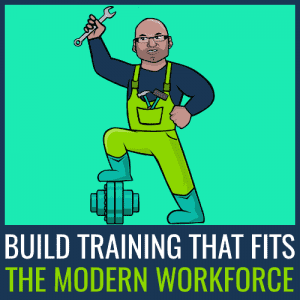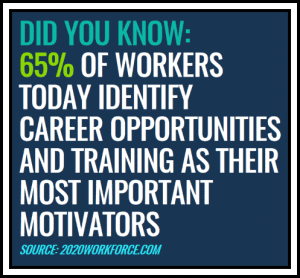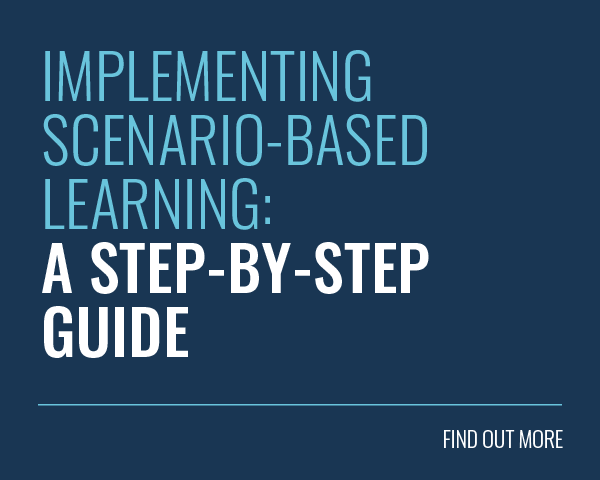 The world of work has gone through a lot of change over the past 50 years. We’re not just talking about the dawn of open plan offices or trend for chrome everywhere! It’s not just the environment that’s changed – it’s the people too. Yes, we’re talking about the rise of the knowledge workers!
The world of work has gone through a lot of change over the past 50 years. We’re not just talking about the dawn of open plan offices or trend for chrome everywhere! It’s not just the environment that’s changed – it’s the people too. Yes, we’re talking about the rise of the knowledge workers!
Knowledge workers are the modern breed of employee that make up the majority of today’s workforce. But what exactly do these workers want and how can you create training to meet their needs?
What are Knowledge Workers?
So, how do you figure out who knowledge workers are? The good news is, knowledge workers are just about everyone! Those people you’re squashed against on your daily commute or staring down in the lunch queue for the last BLT – they’re ‘knowledge workers’! We’re all part of this technology-dependent, information-driven workforce. Knowledge workers directly apply their mental assets (knowledge, skills and ideas) to bring value to their work.
What’s more, knowledge workers are evolving in response to technological advancements to ensure their skills and know-how are up-to-date. You need to do the same! Make sure your training stays relevant and meaningful! This matters, with almost half of people planning to leave their job by the end of the year, you need to meet your employees’ needs, change their minds and hold on to the talent pool.
A brief history of the modern workforce
In the past, most workers stayed in the same career, company and even role for their entire working life. Technological advancements and the resulting new jobs, led to the emergence of knowledge workers! 
In the past many employees were driven by external lifestyle motivators such as salary and location. Although these factors still matter, the modern world of knowledge workers (often called the third industrial revolution) is defined by flexibility, adaptation, collaboration and a desire for continuous development. Learning matters more than ever to knowledge workers, with 65% of employees identifying career opportunities and training as their most important motivators.
Knowledge workers, also want jobs that make a difference, fulfil their passion and give them a sense of purpose. This is especially true of millennials who, research suggests, value experiences over acquiring material items. With millennials soon to make up 75% of employee demographics by 2025 (and generation Z hot on their heels), tailor your training to their needs.
How to retain knowledge workers
Using technology to support our daily lives has become the norm. It’s what people expect and want. So much so, that 1 in 4 workers would leave their current employer to move to a company with better technology.
With the right tools you can create a learning culture and training that meets knowledge workers’ needs and holds on to your organisation’s talent pool. But you need to make sure that the training is good fit for your audience. This is where a learning platform that focuses on employee engagement can help.
Onboarding Knowledge Workers
Everyone likes to receive rewards and feel welcome (just take a look at the plethora of #FirstDay photos out there showcasing the awesome gifts new starters receive). But it’s important to take your onboarding strategy further than the first day celebrations.
Create an onboarding programme that makes new starters feel welcome and helps them understand where they fit into the wider vision of the company. Build a positive, collaborative working environment online, which encourages people to embrace the working culture from the first day they walk through the door (and even before!). The LMS should hold everything new starters need to understand the organization, their team and role. It should also use every available tool to motivate the staff and keep them engaged.
Enabling Knowledge Sharing
Today’s knowledge workers increasingly value the role of collaboration. A strong learning culture encourages people to take ownership of their own learning and share what works with each other. Harness the power of social learning to create an organizational culture that encourages collaboration, sharing and recognition. Give them a platform that lets them contribute to the training programme with user-generated content. This lets the true experts in the organization stand out and lets them create something they can be proud of.
Build Meaning of Epic Proportions
Rewards and social learning will get you so far, but without a deeper meaning, people eventually lose interest. 6 in 10 millennials seek employment that offers a ‘sense of purpose’. With this in mind, ensure the purpose of your training is clear and tied in with the wider company values. Build on the positive working culture established through the onboarding process and LMS. Tell learners why it matters.
Make it Mobile
It isn’t enough to create a brilliant learning culture and training to go with it. You need to make sure it’s instantly accessible, engaging and available anytime, anywhere. In a world where content-loading time sends people’s pulses soaring higher than watching a horror film – you need to provide fast, easy to access, bite-sized learning that’s easily digestible. Don’t let your training become a horror story – make it mobile optimised.
————————————–
You now understand who knowledge workers are and what they want! But, evolution never stops…Stay ahead of the curve with our Engagement Engine workbook. It will help you create the top-notch engagement platform of tomorrow. Click the button to download it now.








